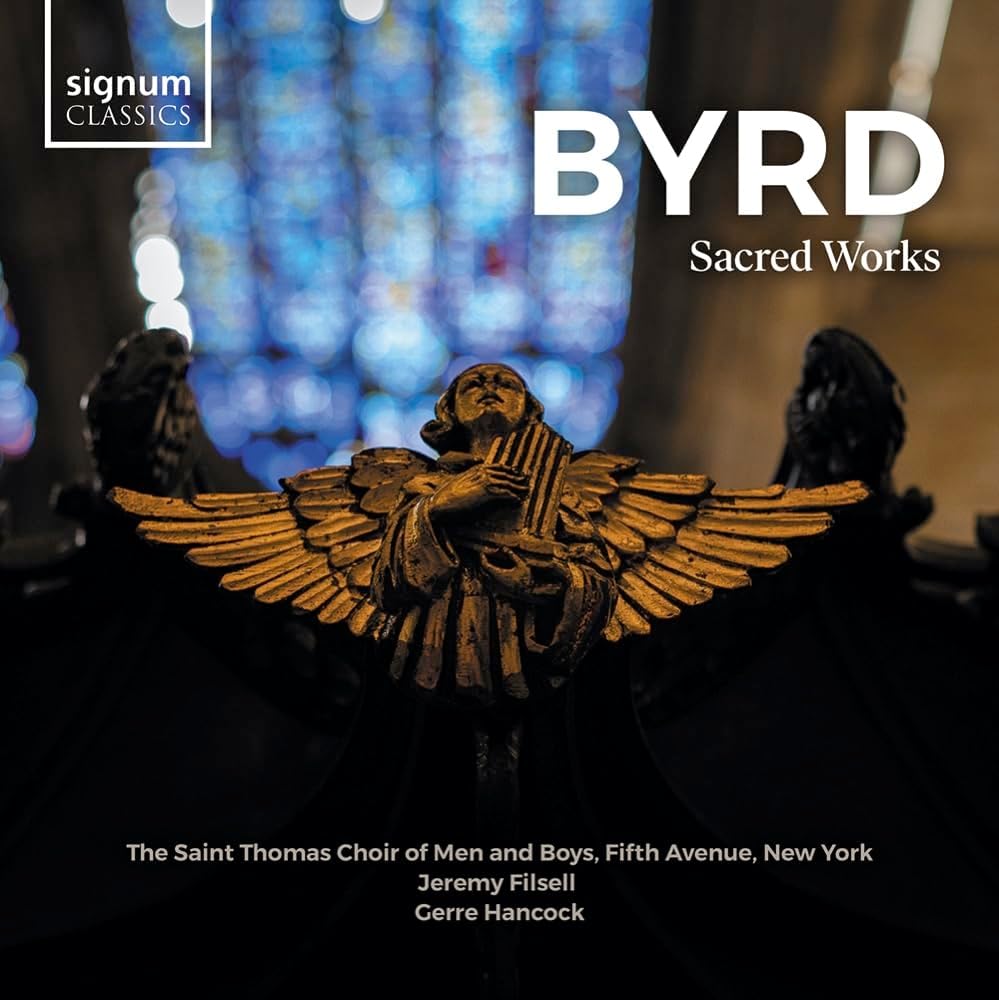The Saint Thomas Choir of Men and Boys, Fifth Avenue, New York, conducted by Jeremy Filsell (2022) with Nicholas Haigh, Assistant Organist; and Gerre Hancock (1981)
Recorded in St Paul the Apostle, Columbus Circle, New York (2022) and St Mary the Virgin, Times Square, New York (1981)
Mass for Four Voices, Propers for Corpus Christi (2022),
The Great Service (1981)
1441:01 (2 CDs)
Signum Classics SIGCD776
This double album has a bland title, “Sacred Works” but … what wonderful works. We cannot have too many recordings of music this good, and when it is performed as well as it is here, we are all winners. After 2023 marked Byrd’s successful, enjoyable and rewarding Quatercentenary, 2024 is the centenary of the rediscovery of Byrd’s Great Service in Durham Cathedral, by his indefatigable cheerleader E.H. Fellowes, and of its first performance in (probably) three centuries, which took place in St Margaret’s Church, Westminster sung by the Newcastle upon Tyne Bach Choir under W.G. Whittaker, himself no mean Byrd scholar. So it is excellent to welcome back into the catalogue St Thomas Choir’s recording of the complete work made in 1981 and hitherto only available as an LP. What sounds as if it might be intrusive traffic noise from Times Square, outside the recording venue, can be heard but this is a small price to pay for the privilege of having access to this stunning performance. (Credit to the engineers who made the transfer from the original LP, a copy of which I used to own.) Of five other available complete recordings, only two are by Anglican church choirs – King’s College, Cambridge, and Westminster Abbey – and neither of those are, like St Thomas New York, unaccompanied. So this is also a unique recording. The performers set out their stall right from the opening verse passage of the Venite, the first canticle in the Service; this is delivered with crystal clarity, the fleeting dissonance on “strength” distinctly audible in the generous acoustic. The recording was made just too soon to take advantage of Craig Monson’s imminent edition (1982) with its new thinking as regards certain verse and antiphonal passages, but there is still some variety between the verse, antiphonal and full passages as laid down in Fellowes’ edition (1948).
Modern trends in Byrd scholarship also impinge upon the rest of the album, the disc and a half recorded over forty years later, which feature the Mass for Four Voices and Propers for Corpus Christi. And these are proper Propers, as they include not only those items for the Feast which are in book one of Gradualia (1605) but also Byrd’s expansive unpublished setting of Sacris solemniis – all nine and a half minutes of it – composed while he was still influenced by Sheppard, whose mentorship of the fledgling Byrd is unfailingly neglected in favour of Tallis. Current scholarly thinking advocates performances of Byrd’s masses by small mixed ensembles, resembling those documented as performing such music in secret recusant chapels during the reign of Queen Elizabeth I, ironically a closet Anglo-Catholic … allegedly. Nevertheless, these masses have now become staples of choral Holy Communion in (protestant) Church of England cathedrals, churches and chapels, as well as in similar Roman Catholic establishments. Also, they are so well composed as to sound as fine in great spaces as in small. The Choir of Saint Thomas Church, New York sings the mass with as much beauty, feeling and expertise as any historically informed ensemble, and I say this as one who favours authenticity so far as it can be achieved in early music. The generously reverberant acoustic takes some getting used to, but once the ears are, so to speak, tuned in, the sound becomes quite ravishing, and although tempi are varied judiciously during the course of the Mass, this is never to the detriment of the clarity of Byrd’s eloquent polyphony, with its sublime melodies, harmonies … and dissonances! In each of his works, Byrd relates a narrative. In liturgical performances, tempi can be varied, subtly or otherwise, but usually in response to musical criteria, such as Classical or Romantic models, or in a perceived need to push on or put the brakes on. St Thomas’s interpretation seems rather to respond to Byrd’s narrative, his response to the text and his inflections in his music that propel his vision. Jeremy Filsell’s subtle pacing does not routinely include sudden bolts after passages of restraint: for instance, in the Credo it is appropriate to show some animation at “Et resurrexit” but he keeps the Choir’s powder drier at the equally tempting “Et unam sanctam” which then allows the singers to wind up over a longer span towards an effective climactic conclusion. Also in the Credo is one of the most sublime passages of singing that I have ever heard in a Byrd Mass on disc, where the layclerks alone sing “et ex patre natum ante omnia saecula”. That said, I must also compliment the boys on their fine singing throughout the entire work, not least those trebles entrusted with the solo passages. A word of congratulation also to the Rector, Revd Canon Carl F. Taylor, who fulfils his roles as Celebrant and Gospeller consummately.
This is a truly radiant recording. As I said of another recent Byrd release, whatever the number of versions you possess of the Mass for Four Voices – many, few, one, none – do, please, give serious thought to purchasing this one … and then buy it! It comes with two priceless bonuses: Byrd’s incandescent Propers for Corpus Christi including that early unpublished setting of Sacris solemniis with its echoes of Sheppard, not Tallis, and its pre-echoes of the treasures to come in Byrd’s music; plus the greatest of all settings of the complete Anglican Service, sung by a Choir as fine in 1981 as it would still be four decades later.
Richard Turbet
